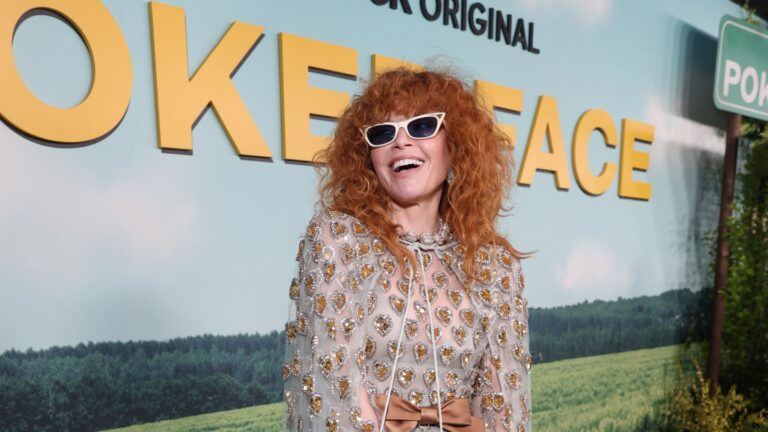Natasha Lyonne had a long press line clamoring for her attention Thursday night at the second season premiere of Peacock’s Poker Face in Hollywood. The veteran actress, whose multi-hyphenate duties on the critically acclaimed comedy series include writing, directing, starring and executive producing, didn’t have time to stop for every outlet before she was needed on the American Legion Post 43 stage to introduce the screening alongside her partner-in-crime Rian Johnson.
So she did something rare (and appreciated among the journalists left waiting outside) by heading to the stage to deliver those comments only to return to the red carpet and give every reporter some of her undivided attention. After detailing the “magic” of the new season thanks to a killer line-up of high-profile guest stars, The Hollywood Reporter asked Lyonne about that other new project of hers on the horizon — an artificial intelligence-infused film Uncanny Valley.
News of the project broke two days before the Poker Face premiere and caused a stir. As reported by THR, Lyonne is set to make her feature directorial debut on the film from a script she wrote with Brit Marling and both are on board to star. Set in the world of immersive video games and said to blend live-action and game elements, Uncanny Valley centers on a teenage girl named Mila who becomes unmoored by a hugely popular AR video game in a parallel present. Partners on the project — designed to offer a “radical new cinematic experience,” per an Asteria representative — include technology innovator Jaron Lanier, the AI-based studio Asteria (founded by Lyonne with partner Bryn Mooser) and Moonvalley.
It was obvious that the buzz had reached Lyonne, who was quick to defend the project during her time with THR. “Of course the movie’s going to be shot like a real movie. Now I’m really threatening to just shoot it on 35 [mm] or something to prove the point because [we are using] real-life human cinematographers and production designers and all that, of course,” explained Lyonne. “I’m a Mr. Moviefone. There’s nothing I love more than movies. Cinema is my very celluloid blood that runs through these veins. I love nothing more than filmmaking, the filmmaking community, the collaboration of it, the tactile fine art of it. I love every aspect of it — it’s so incredible. I understand my own church, in a way, even when the rest of the world doesn’t make sense. In no way would I ever want to do anything other than really create some guardrails or a new language.”
The guardrails she referenced relate to how Moonvalley relies on an AI model called “Marey” that is built on data that has been copyright cleared, unlike other viral industry leaders.
“I have this new studio that I founded, Asteria, with Bryn Mooser, and we found these amazing engineers at Moonvalley, and they agreed off this idea of why is every model dirty, like Runway and OpenAI? And why are they building it off of stolen data? Why do cell phones just have stolen data? It’s a problem,” Lyonne said. “What’s so incredible about Marey is that it’s the first underlying foundational model that you build on top of that is actually on copyrighted license, and you can go in with your concept artist and your storyboard artist and start building out a world.”
Lyonne then praised her collaborators like Marling and Lanier, the latter of whom she called “a pretty heavy hitter in this space” and a “philosophical, ethical guy.” She added: “We’re getting to really find these sort of rules of play and start to understand that there might be a way to actually have some artist protection and carve out within all this that keeps us doing the thing that we love.”
Speaking of that affection, Lyonne then recalled how close she was with the iconic filmmaker Nora Ephron. “She was a real mentor of mine — I played a lot of poker — and she would say, ‘Whatever you do, don’t be a female filmmaker. You’re only allowed one mistake and they never let you work again.’ Of course she made so many hits that wasn’t exactly true, but it was an interesting lesson about the opportunities that are given or not. I really see this as a way to get a chance to make those sort of Avengers-style sequences or something that are essentially green screen and CGI. That’s mostly what [AI] is going to be used for, and that’s what the word ‘hybrid’ means here.”

Asteria, an artist-led generative AI film and animation studio, and Moonvalley, an imagination research company, launched the first clean AI video model, which was celebrated at a L.A. party in April hosted by Asteria’s co-founders Bryn Mooser and Natasha Lyonne.
Joelle Grace Taylor for Asteria


